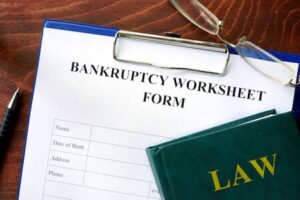
If you’re considering filing for Chapter 7 bankruptcy, you probably already know that a key benefit of the process is emerging debt-free and getting a fresh start. If you qualify, you can wipe out credit cards, medical bills, and other unsecured debt, while also enjoying an automatic stay against creditors seeking payment. However, there are strict rules associated with Chapter 7 bankruptcy. One of the most important is the “means test,” which assesses your income as a determining factor for purposes of eligibility.
There’s more to the Chapter 7 means test than a simple dollar amount, as bankruptcy courts will evaluate multiple factors and apply them to your unique situation. For this reason, retaining a Toledo bankruptcy attorney is crucial. You might also find it helpful to review some of the basics.
Purpose of the Means Test:
Though there are drawbacks in terms of your credit rating, the benefits of filing Chapter 7 bankruptcy are significant for the individual who files. When the process concludes, you have opportunities to build good credit without the burden of overwhelming debt. For many people dealing with interest and late fees they can’t pay off, bankruptcy is a smart financial move. The means test was implemented to prevent high wage earners from eliminating their debts when they do have the ability. In short, if you make too much, you’re not eligible for Chapter 7.
For a free legal consultation, call (419) 930-3030
Eligibility Rules:
According to US Bankruptcy Code regulations, there are two factors for determining whether you qualify for Chapter 7 according to the means test:
- If your current monthly earnings are under the threshold median income for Ohio, you pass the means test. The amount is based upon your household size and how many people contribute financially. You can file for Chapter 7.
- When your monthly household income exceeds the threshold amount, your disposable income is the focus. To calculate the amount, refer to what you earn and subtract allowable expenses. Examples include housing costs, utilities, food, and other necessities. If it’s possible to pay some of your unsecured debts, you may NOT qualify under the means test.
Personal Injury Lawyer Near Me (419) 930-3030
Pass-Fail on the Chapter 7 Bankruptcy Means Test:
For individuals who aren’t eligible under the rules regarding the means test, Chapter 13 might be an option. Repayment is the objective of the process, though you may not have to pay the full amount that you owe creditors. There are additional advantages of filing Chapter 13 if you want to retain assets that would otherwise be liquidated in Chapter 7.
Get Additional Details from a Toledo, OH Bankruptcy Lawyer
The Chapter 7 means test is just of many complicated laws involved with the bankruptcy process, so it’s wise to work with an experienced attorney who can assist with your matter. Our team at Groth & Associates is dedicated to helping clients look forward to a brighter financial future through bankruptcy, so please contact us to set up a consultation. You can reach our Toledo, OH office by calling 419.482.1176 or visiting our website.
Call or text (419) 930-3030 or complete a Free Case Evaluation form


